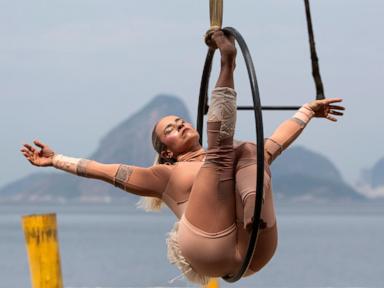A unique aerial circus performance in Niteroi, Brazil, has drawn attention to the pervasive issue of gender-based violence, providing a platform for healing among female victims. The show, titled “Alone we are petals, together we are roses,” premiered on a beach opposite iconic Rio de Janeiro landmarks, including the Christ the Redeemer statue and Sugarloaf Mountain.
This poignant performance featured six women and two men who showcased their skills in a visually striking display. The act began with a female performer in a pink bodysuit strutting on stilts, only to be knocked down by her male counterparts. Through the narrative arc, she reclaims her strength, culminating in a triumphant return on even taller stilts, symbolizing resilience and empowerment.
Rosa Caitanya Hamilton Azevedo, a 31-year-old artist who portrayed the victim, shared her personal connection to the performance. Having experienced gender-based violence herself, she remarked, “After we go through all of this, we grow even more. We become stronger. Not that this is a good way of learning how to be a woman, but we end up stepping into it.”
The performance was the brainchild of Juliana Berti Abduch, who developed the Suspended Circus Acrobatics project in 2020. Following a previous show that highlighted domestic violence, Abduch stated that this new piece aims to address the multifaceted nature of violence against women. Participants often arrive traumatized, but through the project, they begin to overcome their fears and limitations. “I’m certain that the project helped make the women feel much more secure,” Abduch noted after the debut.
Approximately 100 spectators gathered to watch the performance, which captivated passersby on the busy beach. The show used aerial hoops, trapezes, and silks to deliver its powerful message. Audience member Fabiane Curione de Medeiros expressed her reaction, saying, “I found it impactful. I think the message — that women need to unite and expose the violence — needs to become a reality.”
The statistics surrounding violence against women in Brazil are alarming. According to a 2025 report from the Brazilian Forum on Public Safety, more than one in three women in Brazil experienced sexual or gender-based violence in a single year, marking the highest incidence since records began in 2017. During the performance, various statistics were broadcast from an amplifier, including the shocking revelation that a woman is raped every six minutes in Brazil.
The ongoing struggle for women’s rights in the country is exemplified by the contentious legal status of abortion. While permitted under certain circumstances, access remains fraught with difficulties, leaving many women without necessary support.
Hamilton Azevedo expressed the dual purpose of the performance: to raise awareness of the issue while also offering hope. “The show generates a heavy atmosphere, because we talk about the situation. But we also show that there are paths and strategies to fight against it,” she explained. “We wanted to move away from that place of sadness and hold onto hope that the future will be better. And build that future through art, sport, and the empowerment of women.”
This extraordinary blend of art and activism aims not only to entertain but also to foster dialogue and inspire change in a society grappling with the realities of gender-based violence.







